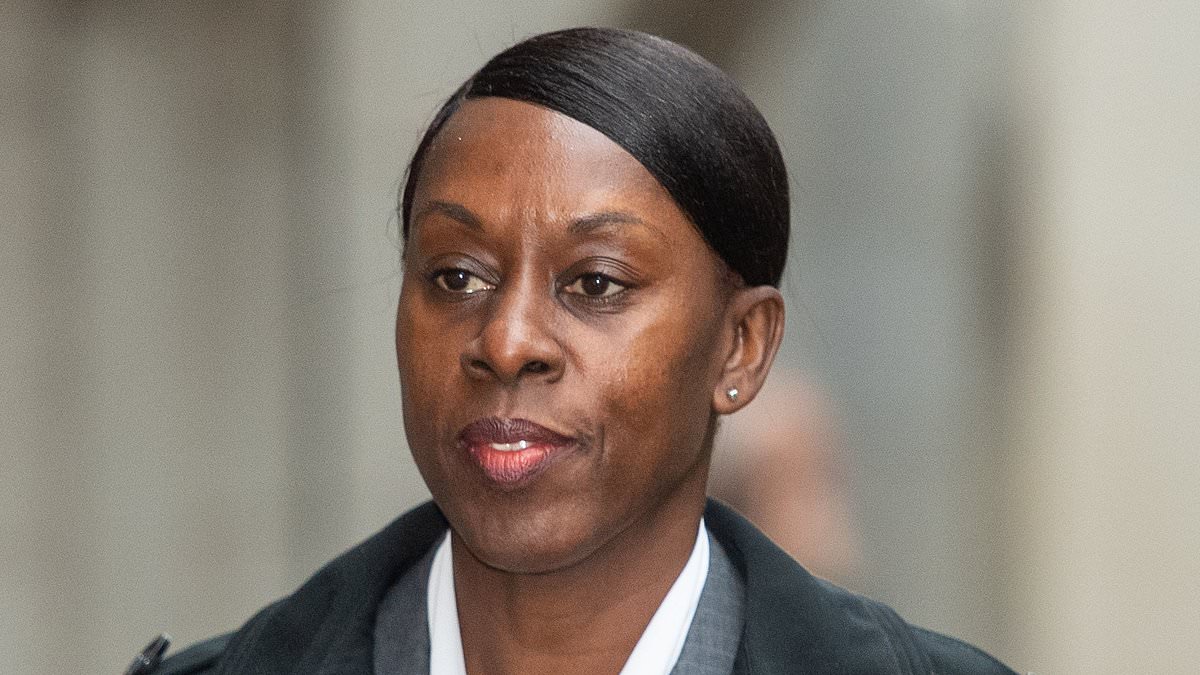A former senior female police officer has sued the Met Police for race and sex discrimination for the way she was treated after being convicted for possession of a child abuse video.
Ex Superintendent Novlett Williams claims the ‘actions’ taken by the force were ‘disproportionate’ and part of a ‘campaign’ to get rid of her.
The former officer, who was commended for her Grenfell Tower work, was convicted in 2019 after her sister sent her the video on WhatsApp and urged her to investigate it.
Although she never viewed the child abuse clip, Supt Williams failed to report it and she was placed on the Sex Offenders’ Register.
After resigning in March last year, Supt Williams has now taken legal action against the Met Police.
Taking the force to an employment tribunal, she alleged that the in the aftermath of her conviction the Met sought to ‘bring about the end of her employment’.
She claims the force applied ‘pressure’ to the Crown Prosecution Service to bring further charges against her after accusing her of failing repeatedly to comply with her sex offender notification requirements.
Supt Williams said the ‘actions’ taken against her were ‘disproportionate to her role in any crime’ and she was treated ‘more seriously’ than any white and/or male colleague who committed ‘more serious’ misconduct.
The Met tried to have her claims thrown out, but an employment judge ruled that the case should proceed to a full tribunal hearing so they can be heard.
Supt Williams received a criminal conviction in 2019 for possession of an indecent image of a child.
The officer was sent a video by her sister and she told jurors that she only became aware of its ‘indecent contents’ after her arrest.
She was sentenced to 200 hours of unpaid work and was placed on the sex offenders registers, a ‘lenient’ sentence from the Old Bailey judge who said it was a ‘complete tragedy’ that she found herself in the position she was in.
In March 2020, Supt Williams was dismissed from the force for gross misconduct after a special disciplinary hearing.
But, the officer appealed against that decision and it was upheld by a panel which decided that she should have been issued with a final written warning rather than being dismissed.
She went on to resign from the Met, claiming it was due to discrimination.
Supt Williams is now bringing claims of race and sex discrimination over a number of incidents.
At a preliminary in central London, it was heard the officer went on a trip to Kenya in 2019.
Supt Williams told the judge that she was invited to attend a conference in the East African country and informed a Deputy Assistant Commissioner in the force that she would be taking annual leave.
Being on the Sex Offenders Register requires offenders to provide the police with certain information including changes of address and details of bank accounts,
But, it was heard Supt Williams had not informed the officer who has been appointed as her manager regarding the Sex Offenders Register of her trip.
During the proceedings, Supt Williams claims the force were ‘disproportionately pursuing her for notification errors’ and ‘informing her offender manager’ of such mistakes.
In light of the failure to report this, Supt Williams was offered by the Met to resolve the matter by taking a caution.
But, it was heard she ‘refused as she felt the offer of a caution was another route to dismissal which was unfounded and would not have been applied to white and/or male counterparts’.
Supt Williams accused the force of applying ‘pressure to the Crown Prosecution Service to bring these charges in its ongoing attempt to dismiss’ her.
She also accused the force of failing to pay her ‘appropriate back pay’ following her reinstatement of an officer and for imposing eight additional notification requirements on her.
In June 2023, Supt Williams was charged with failing to notify police of information required seven times between 22 November 2019 and December 11 2021.
This related to her failing to tell authorities about details of bank accounts and credit cards and the trip to Kenya.
Supt Williams pleaded not guilty to all charges and the case was eventually dropped after a court heard she was left traumatised by her legal ordeal.
Ruling that there should be a full tribunal hearing, Employment Judge Rachel Mellor said: ‘[Supt Williams] feels the actions taken against her were disproportionate to her role in any crime and were treated far more seriously than many of her male and/or white colleagues.
‘Although there is no direct comparator [she] indicates she will rely on white male evidential comparators who were not subjected to the same or similar treatment despite committing more serious misconduct.
‘[Supt Williams’] complaint is that she was disproportionately pursued and that her employer notified her offender manager.
‘It is her claim that the ‘reason why’ they did this was to create a set of circumstances to bring about her termination because she is black and/or a woman.
‘She is not saying simply the decision to prosecute her was discriminatory, she is saying the decision was bound up with the [MET’s] desire to terminate her role because of her race and/or sex.’
The Met Police contest the claims in their entirety.
Judge Mellor refused to strike out her claims of sex and race discrimination, despite the assertions made by lawyers acting on behalf of the force.
She said: ‘Given the context set out by [Supt Williams’ and her allegation that these decisions formed part of a campaign to dismiss her from her employment it seems to me it is more than merely fanciful to argue they are detriments suffered by the claimant as an employee.
‘That is a matter that can only properly be determined on hearing evidence, at which point the tribunal will be able to decide whether it has jurisdiction.’
A full tribunal will take place at a later date.
